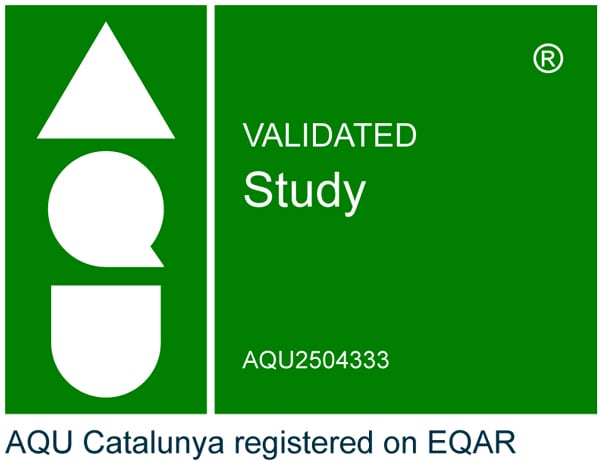
Bachelor Degree in Fine Arts
BAU's Bachelor's Degree in Fine Arts was created with a desire to contribute to the transformation of society through art. It is also inspired by the conviction that artistic practice has a unique power to propose new ways of feeling, thinking and living, from an artistic sensibility, environmental commitment and social responsibility.
Description of the curriculum
- Edition: 3rd
- Teaching period: from October 2024 to June 2025
- Schedule: mornings from 9am to 2.30pm or afternoons from 3pm to 8.30pm
- Modality: on-site
- Language: Spanish and Catalan
- Price: 143 € / ECTS
- Duration: 4 academic years
- Qualification: Bachelor Degree in Fine Arts by the University of Vic - Central University of Catalonia
- Credits: 240 ECTS
- Academic calendar 2023-24
Presentation
BAU's Bachelor's Degree in Fine Arts was created with a desire to contribute to the transformation of society through art. It is also inspired by the conviction that artistic practice has a unique power to propose new ways of feeling, thinking and living, from an artistic sensibility, environmental commitment and social responsibility.
With the Bachelor's Degree in Fine Arts, BAU consolidates its educational contribution in the fields of Arts and Humanities. Fine Arts students now have an exceptional opportunity to become relevant creators in present and future society.
The Bachelor's Degree in Fine Arts addresses students with a proactive, curious, non-conformist and autonomous attitude. It is aimed at training artists who understand art as a field of experimentation, accepting the challenges of our time.
For this reason, it provides them with tools, methods and technologies in a syllabus situated in the present but with a perspective of the evolution of Fine Arts throughout history. The programme consists of project-based subjects and supports students' individual development, encouraging the development of their own language with clarity and communication skills.
Structured over four courses, the syllabus proposes an itinerary that starts with the discovery of the students' interests, by learning to articulate them through processes and projects. It therefore puts artistic practice at the very centre, with the workshop and the classroom as axes of on-site training, offering shared time and spaces for learning. At the end of the course, students will be fully capable to work both individually and collectively with character and a resolute spirit.
In essence, it is a multilingual syllabus aligned with different professional art contexts which generate continuous and stimulating relationships with practicing artists, companies, institutions, galleries, critics and programmers. Consequently, it prioritises consolidating employment opportunities.
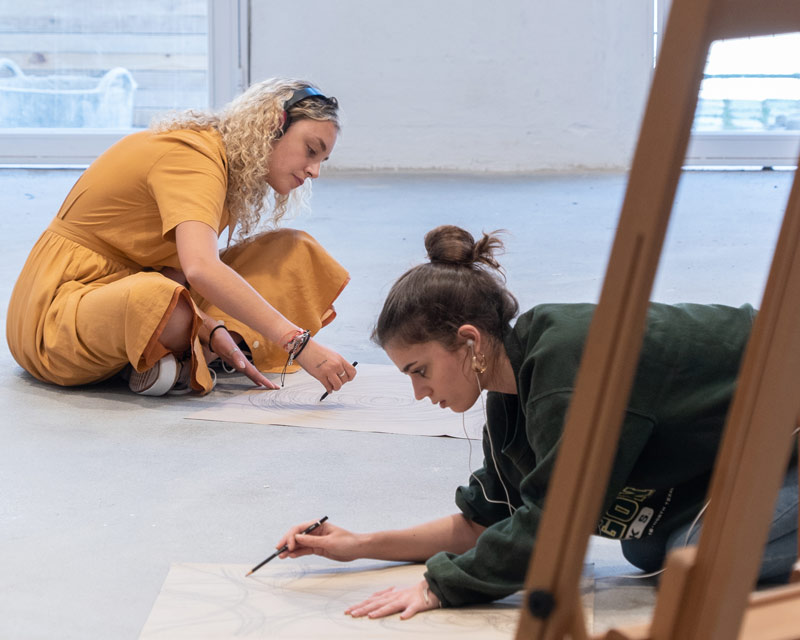
Reasons to study a Bachelor's Degree in Fine Arts at BAU
- Because it is based on a firm commitment to our times, with an awareness of the need to imagine and embody new realities, it questions what artistic practice is and what it can become, and proposes innovative and transformative solutions.
- Because it combines media and languages that are new to artistic practices, such as programming, interaction and digital fabrication, with others that are already consolidated, such as performance, drawing, sculpture, painting and audiovisuals.
- Because its teaching staff is actively involved in the professional scene and fully aware of the dynamics, processes and techniques of contemporary art; young, cosmopolitan and polyvalent artists who work as a team in a coherent and coordinated way.
- Because it is linked to different professional contexts, collaborating with practicing artists, carrying out external internships, and integrating into the local and international cultural network through exhibitions, events and projects.
- Because it connects art with humanities, sciences and technologies, encouraging transdisciplinary perspectives and exploring other paths that broaden the possibilities of an artistic career.
- Because it links tradition with modernity and critical reflection with transformative action, with the strength of an innate curiosity and willingness to dialogue through art - with the city, the country, the world and, above all, with people.
- Because it actively participates in the great debates and challenges of contemporary society (artistic, but also cultural, political and environmental), in a responsible way and with the intention of becoming a pole of creativity, innovation and talent.
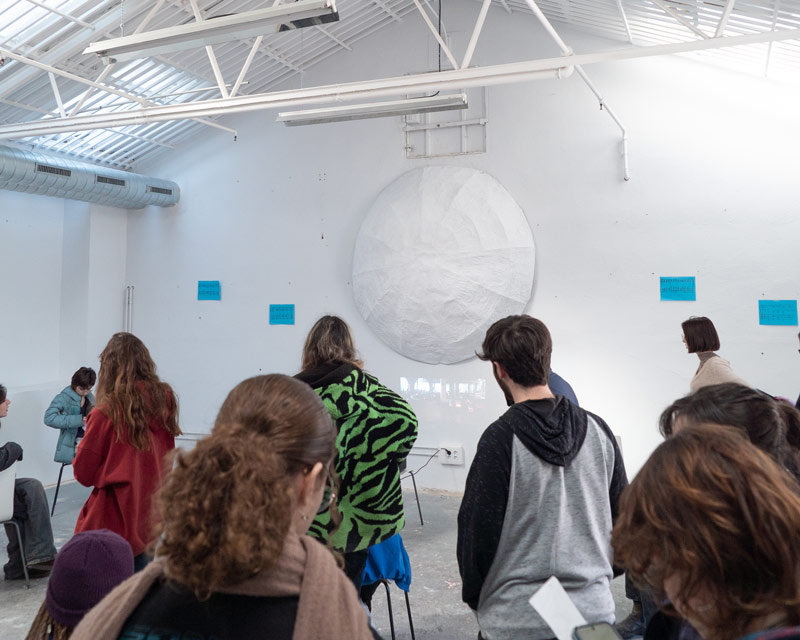
Study Plan
Programme of studies
Credits by type of subject:
- Basic training: 60 ECTS
- Compulsory: 102 ECTS
- Elective: 60 ECTS
- External internship: 6 ECTS
- Final project: 12 ECTS
TOTAL: 240 ECTS
First year
Choice of 60 ECTS
| Credits | Type | Semester | |
| Modern Thought and Artistic Practices | 6 ECTS | Basic Training | 1st semester |
| Drawing Workshop I | 6 ECTS | Basic Training | 1st semester |
| Visualisation and Documentation Workshop | 6 ECTS | Basic Training | 1st semester |
| 2D Discourses, Techniques and Technology | 6 ECTS | Required | 1st semester |
| 4D Discourses, Techniques and Technology | 6 ECTS | Required | 1st semester |
| Esthetics | 6 ECTS | Basic Training | 2nd semester |
| Drawing Workshop II | 6 ECTS | Basic Training | 2nd semester |
| Art, Institution and the Market | 6 ECTS | Basic Training | 2nd semester |
| 3D Discourses, Techniques and Technology | 6 ECTS | Required | 2nd semester |
| Processes and Projects Laboratory I | 6 ECTS | Required | 2nd semester |
Introduction. Discovery. Location.
The aim of the first year is to introduce students to the main aspects of artistic practice and Fine Arts studies.
It offers a panoramic view of techniques and technologies, grouped in workshops that transversally address two-dimensional practices (such as photography or painting), three-dimensional practices (such as sculpture or digital fabrication) and time-based practices (such as audiovisual work or performance), showing the interdependence of the material configuration and the emergence of languages.
Art history is introduced as a viewpoint from which to examine the ever-changing role of artistic practices and the artist in society, and to critically reflect on the concepts that have historically shaped the field of aesthetic thought.
Theory is introduced as an integral aspect of practice, understanding the formation of discourse and research as integral parts of the artist's work. Methodological understanding of artistic practice is introduced.
It is organised in processes and projects, in subjects that allow students to begin to explore and define their own interests.
The first year also focuses particularly on the communicative aspects of artistic work, both in its instrumental and expressive dimensions.
Students are introduced to understanding how to present ideas, processes and results, showing and explaining their work in graphic, textual, audiovisual and performative forms.
Students are introduced to the functioning of the professional, institutional and economic contexts of art.
Second year
Choice of 60 ECTS
| Credits | Type | Semester | |
| Contemporary Thought and Artistic Practices | 6 ECTS | Basic Training | 1st semester |
| Writing and Communication Workshop | 6 ECTS | Basic Training | 1st semester |
| 2D Discourses, Techniques and Technology Installations | 6 ECTS | Required | 1st semester |
| 4D Discourses, Techniques and Technology Installations | 6 ECTS | Required | 1st semester |
| Processes and Projects Laboratory II | 6 ECTS | Required | 1st semester |
| Art, Activism, Mediation and Pedagogy | 6 ECTS | Basic Training | 2nd semester |
| 3D Discourses, Techniques and Technology Installations | 6 ECTS | Required | 2nd semester |
| XD Discourses, Techniques and Technology | 6 ECTS | Required | 2nd semester |
| Processes and Projects Laboratory III | 6 ECTS | Required | 2nd semester |
| Anthropology | 6 ECTS | Basic Training | 2nd semester |
Self-awareness. Experimentation. Contextualisation.
The second year builds upon the experiences and skills acquired during the first year, developing languages based on experimentation with a wide range of techniques and technologies.
In addition, workshops foster a set perspective in relation to each medium, learning to understand the specifics of each way of exhibiting work.
Knowledge of the transformation of artistic practices throughout history is broadened and an anthropological viewpoint is also introduced.
The connection between theory, practice and research within artistic work is deepened, and the articulation of practice in processes and projects continues to mature, developing one's own ideas based on observation, research, reflection and experience.
During the second year, emphasis is also placed on the communicative aspects of artistic work, introducing writing as a transversal tool and English language proficiency in the professional context.
The development of individual practice is pursued, but emphasis is placed on the importance of building a strong sense of community, encouraging group work, collective and collaborative practices, as well as the need to share processes and results.
Finally, students are introduced to the understanding of critical structures and organisations which explore the possibilities of other communities and practices beyond the institutional contexts of art.
Third year
Choice of 60 ECTS
| Credits | Type | Semester | |
| Elective Subjects | 36 ECTS | Elective | 1st or 2nd semester |
| Processes and Projects Laboratory IV | 6 ECTS | Required | 1st semester |
| Art Practices in Context Seminar I | 6 ECTS | Required | 1st semester |
| Artistic Practices and Research | 6 ECTS | Required | 1st semester |
| Processes and Projects Laboratory V | 6 ECTS | Required | 2nd semester |
Knowledge. Professionalisation. Socialisation.
In the third year, the overview developed during the first two years allows students to start consolidating and singularising their practice, working both individually and in a collective and collaborative way, and actively participating in their learning process together with teachers and colleagues.
For this purpose, challenges and frameworks are proposed, encouraging students' practice to mature in its formalisation and associative resonances, as well as in the ways it is exhibited and presented, opening it to a wider public, both inside and outside the academic context.
Students are offered the possibility to progress in the comprehension and perfection of techniques and technologies they have already studied, or to begin to learn others, so they can choose which languages, techniques and media are relevant to them.
This technical and procedural specialisation intersects with the possibility to approach debates that appeal to present artistic practices from different fields, reinforcing, in addition, the crucial role of theory and research.
Seminars on artistic practices in context allow students to deepen their understanding of this intersection of thematic and disciplinary fields of interest, languages, techniques, media and methodologies through the proposals of practicing artists.
Note: to choose 36 ECTS of optional subjects
Fourth year
Choice of 60 ECTS
| Credits | Type | Semester | |
| Elective subjects | 24 ECTS | Elective | 1st or 2nd semester |
| Art Practices in Context Seminar II | 6 ECTS | Required | 1st semester |
| Transdisciplinary and Experimental Methodologies | 6 ECTS | Required | 1st semester |
| Workplacement in Companies | 6 ECTS | External internships | 1st semester |
| Processes and Projects Laboratory VI | 6 ECTS | Required | 1st semester |
| Final Degree Project | 12 ECTS | Final Project | 2nd semester |
Final Project. Research. Situated Practice.
In the final year, students have the opportunity to continue defining which languages, techniques and media are relevant to their practice, and to approach the thematic and disciplinary fields of interest they wish to address, delving deeper into aspects of methodology.
The active questioning of the role of the artist and art in society, and their articulation as established practices and in specific work contexts, is proposed as a catalyst for the individuality of each student, which is reflected in their way of research, action and presentation.
Artistic practice seminars in context offer the possibility for students to put their work in dialogue with that of other practicing artists, and between the third and fourth year, students are required to carry out an external internship, which will allow them to familiarise themselves with a professional environment.
Finally, students must consolidate the skills and knowledge acquired in an integrative process that culminates in the Final Degree Project, which could be considered as the first project of their professional career.
Note: to choose 24 ECTS of optional subjects
Optional Subjetcs
In the last two academic years, the student can diversify their curriculum by choosing elective credits of a more specialized and personalized nature by taking 56 ECTS of these elective subjects that can be taken indistinctly during the 3rd year (32 ECTS) and 4th year (24 ECTS).
Electives Degree in Fine Arts
Third and Fourth year
| Credits | Type | Semester | |
| Experimental Drawing Workshop | 6 ECTS | Elective | 1st or 2nd semester |
| Experimental Pedagogy Workshop | 6 ECTS | Elective | 1st or 2nd semester |
| Pictorial Procedures Workshop | 6 ECTS | Elective | 1st or 2nd semester |
| Experimental Pictorial Procedures Workshop | 6 ECTS | Elective | 1st or 2nd semester |
| Sculptural Procedures Workshop | 6 ECTS | Elective | 1st or 2nd semester |
| Digital Manufacturing Workshop | 6 ECTS | Elective | 1st or 2nd semester |
| Performance and Action Workshop | 6 ECTS | Elective | 1st or 2nd semester |
| Relational Practices Workshop | 6 ECTS | Elective | 1st or 2nd semester |
| Animation and Stop Motion Workshop | 6 ECTS | Elective | 1st or 2nd semester |
| Video Art Workshop | 6 ECTS | Elective | 1st or 2nd semester |
| Online Digital Arts Workshop | 6 ECTS | Elective | 1st or 2nd semester |
| Interaction Workshop | 6 ECTS | Elective | 1st or 2nd semester |
| Programming Workshop | 6 ECTS | Elective | 1st or 2nd semester |
| Artist Editions Workshop | 6 ECTS | Elective | 1st or 2nd semester |
| Soft Materials and Print Workshop | 6 ECTS | Elective | 1st or 2nd semester |
| Sound Art Workshop | 6 ECTS | Elective | 1st or 2nd semester |
| Critical Practices in the Arts and Humanities | 6 ECTS | Elective | 1st or 2nd semester |
| Critical Practices in the Arts and Social Sciences | 6 ECTS | Elective | 1st or 2nd semester |
| Critical Practices in the Arts, Science and Technology | 6 ECTS | Elective | 1st or 2nd semester |
| Contemporary Debates in the Arts and Humanities | 6 ECTS | Elective | 1st or 2nd semester |
| Contemporary Debates in the Arts and Social Sciences | 6 ECTS | Elective | 1st or 2nd semester |
| Contemporary Debates in the Arts, Science and Technology | 6 ECTS | Elective | 1st or 2nd semester |
Objectives
- Critically reflect and evaluate the implications of artistic practices with respect to the different contexts in which they have an impact.
- Understand contemporary and historical art reference frameworks and use them in a conscious, critical and innovative way.
- Carry out ideation and experimentation projects and processes in a decisive and sensitive manner according to one's specific needs.
- Apply appropriate research methodologies in processes of experimentation and formal production.
- Coherent and efficient use of expressive languages and representation techniques in the development of professional projects.
- Master processes of experimentation, development and presentation of two-dimensional, three-dimensional, audiovisual, installation, performative and relational works.
- Understanding of the properties and combined behaviour of techniques, technologies and materials in order to be able to use them with aesthetic sensitivity and social and environmental responsibility.
- Master the use of aesthetic and symbolic communication codes, as well as specific artistic language.
- Analyse and relate data, concepts and knowledge from different sources and apply them creatively in working processes.
- Contribute effectively to structures of cooperation and collaboration in the development and execution of proposals, within and outside the contexts of art.
- Structure and articulate reasoning in a critical and justified way in contexts of discussion and analysis.
- Plan and efficiently manage individual or team work processes of artistic projects of different complexity.
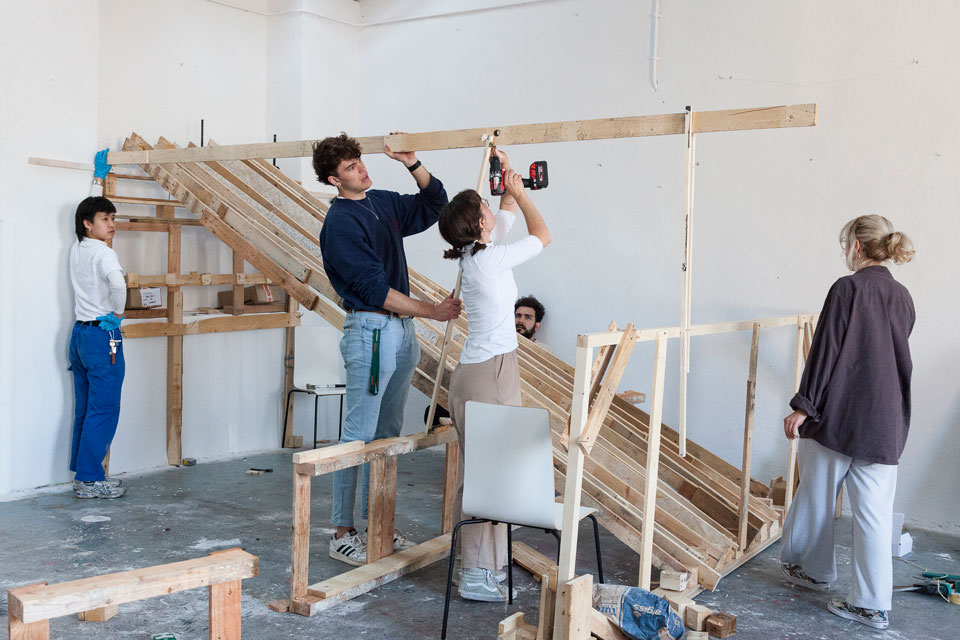
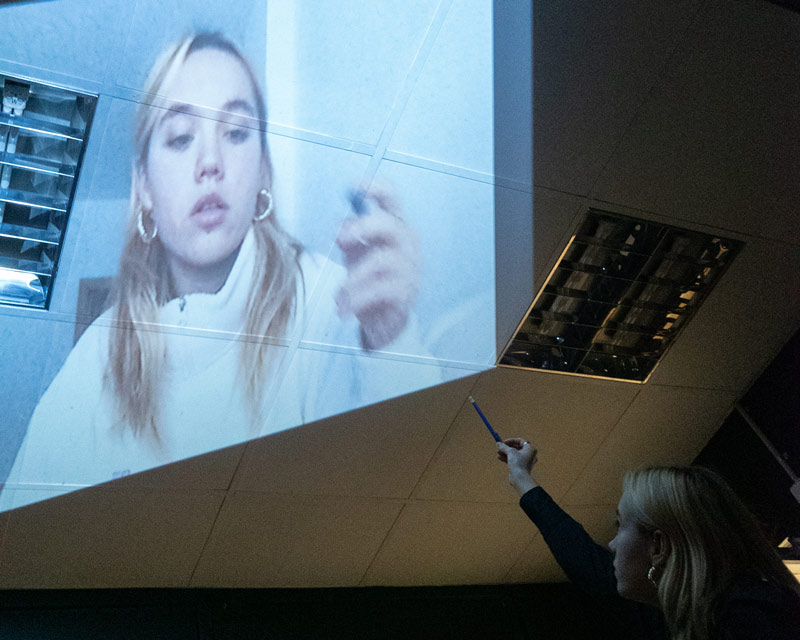
International Mobility
Mobility programs are a fundamental line of action to facilitate the exchange of content, methodologies and resources, and to enhance the generation and transmission of knowledge.
From this perspective, student mobility is considered at BAU as a means of mutual knowledge between different countries and cultures that invites intercultural dialogue and an exchange of enriching educational experiences.
BAU promotes the mobility of its students, amd his international recognition as a design institution offersthe possibility of an international education under ERASMUS program regulations within Europe and with exchange programs with foreign universities prestige.
List of schools and universities with ERASMUS agreement and collaboration agreements.
Teachers
Director of studies
Lúa Coderch
PhD in Fine Arts. Degree in fine arts. Artistic production
Head of departments
Rebecca G. Mutell
PhD in Fine Arts. Bachelor of Fine Arts (Image)
María Fernanda Moscoso
Phd of Anthropology
Rafel Griera
Artist and teacher
Núria Gómez Gabriel
PhD in Communication. Cultural researcher, writer and art curator
Agustín Ortiz
Visual artist. Filmmaker
Michael Lawton
PhD on Fine Arts. Artist, writer and teacher
Jaume Ferrete
Artist, researcher and teacher. Voice, performance and technologies
Eulàlia Rovira
Artist
Luz Broto
Artist and teacher. Spatial practices.
Daniel Pitarch
Doctor. Researcher and artist
Quim Packard
Cultural producer
Lara Fluxà
Artist
Pep Vidal
Doctor in Physical Sciences. Artist, researcher and teacher
Regina Giménez
Plastic artist
Núria Inés
Artist. Storytelling and graphic storytelling
Paula Bruna
Doctor, artist and environmentalist
Federica Matelli
Doctor. Graduated in Philosophy. Aesthetics and Theory of Contemporary Art
Rebecca G. Mutell
PhD in Fine Arts. Bachelor of Fine Arts (Image)
Lúa Coderch
PhD in Fine Arts. Degree in fine arts. Artistic production
Anna Clemente
Architect
Mariona Moncunill
PhD. Artist. Researcher
Serafín Álvarez
PhD Candidate. Master in Artistic Productions and Research
David Ortiz Juan
Master in Visual Arts. Artistic production.
Anna Dot
PhD. Degree in Fine Arts. Teacher and artist
Ariadna Guiteras
Master in Productions and Research. Artist. Performative practices. Installation. Drawing
Oriol Vilapuig
Degree in fine Arts. Artist. Pictorial practices and drawing
Rasmus Nilausen
Master in fine Arts. Pictorial practices
Ludovica Carbotta
Master in fine arts. Artist. Sculptural practices. Installation. Drawing
Alejandra López Gabrielidis
PhD. Degree in Philosophy. Art and digital technologies
Anna Moreno
Doctoral student. Artist
Julieta Dentone
Ceramist. Cultural mediation, teacher
Mercedes Pimiento
Artist and researcher
Career Opportunities
- Artist in all its modalities (creation and research in the field of art).
- Cultural management (technical and management tasks in art production centres, art galleries, museums, exhibition halls and art fairs, cultural promotion and event organisation).
- Specialist in production processes (pictorial and sculptural techniques, photography, video production, exhibition production and assembly, etc.).
- Art direction and creation (creative staff in technological, design and advertising companies, press and television, audiovisual production companies, art galleries, art production centres, fairs and contests, etc.).
- Advisory or consultancy
- Mediation (in the educational departments of museums and cultural institutions or on a freelance basis).
- Exhibition curatorship (curating, conceptualisation and organisation of exhibitions and art events).
- Teaching and artistic education (secondary school teachers, specialised artistic education, university, creative workshops, technical training in specialised schools, etc.).
Cost
The total cost of the course depends on the number of ECTS inscribed plus the student insurance, management fees and university fees.
The price of the ECTS credit for the 2024-25 course is 143€.
The fixed cost of university fees, management fees and insurance for the 2024-25 academic year is 200€.
The total amount of the course for 60 ECTS is 8.522,60 €.
Payment conditions:
- Single payment: if you pay the full course upon enrollment a 3% discount is applied to the total amount of the ECTS .
- Installment payment: consists of an initial payment of 3.380 € upon enrollment (includes university taxes) + 9 monthly installments of 600€ (from October to June).
Scholarships and grants
As a BAU Bachelor student, you can take advantage of different scholarships and grants throughout your academic life at the center, as well as special discounts and preferential internal and external financing conditions.
Access and registration
Access
The registration period for the Bachelor's Degree in Fine Arts for new students takes place according to the calendar established by the University Preregistration office of Catalonia (Oficina de Preinscripción Universitaria de Cataluña).
Students educated in Spain
- COU with the PAAU
- Higher School level LOGSE with the PAAU
- 2nd degree from FP
- Training cycles from the Superior Degree
- Admissions exams for prospective university students over the age of 25, 40 and 45
- Graduate students
- Students from other universities with a minimum of 30 credits recognized
Students from a foreign education system
Students from European Union countries or from countries outside the European Union will find more information about the access requirements here.
Entrance
Through the official University Preregistration of Catalonia.
Quality
The quality of the BAU pedagogical system is guaranteed by various indicators and reports by the seals of (AQU, RUCT, EUC ...).
Degree registered in the Register of Universities, Centers and Titles, RUCT
Download the brochure
Enter your details and we will send you an email with the Bachelor Degree in Fine Arts brochure.
